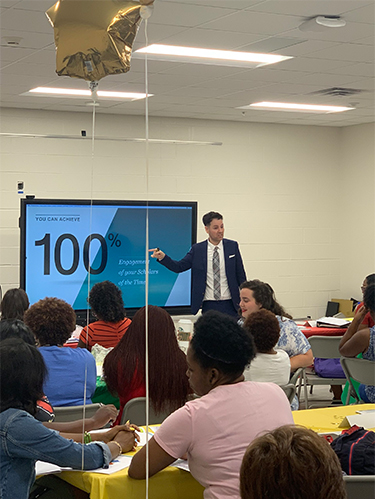In this blog series, we are interviewing a member of the CT3 team about their background in education as well as the expertise that they each bring to their work with educators across the country.
Tell us about your background in education.
I was a raised by a single mother who preached to me the importance of getting an education starting at an early age. No one in my family had earned a high school diploma up to that point and my mother knew the real-life results of not having that piece of paper. She did not want me to struggle the way she had. So, it was made clear to me that the expectations was to get to and through college. My mother set the bar higher than high school because she wanted better for me. I wasn’t perfect in school but I knew what my mother expected and failure was not an option. I am here because of her.
Why did you want to become a teacher?
My family moved a lot when I was a kid, so I went to a lot of schools. Some were excellent, some were good, and others were awful. This led me to become aware of the opportunity gap right around fourth grade. I was at a new school that was teaching about things I already knew and students were not following rules but no one seemed to care. I vividly remember thinking about how similar many of the kids were to those I knew at my last school. The kids were the same and the building was fine. It was the adults were acting differently. They taught without urgency and tolerated behaviors that my mother never would. This realization – that adults could be make a school truly great when they took responsibility for outcomes made me want to be a teacher.
What was your first teaching experience like? What did it teach you?
I began teaching in New Orleans in 2007 in the aftermath of Hurricane Katrina. I joined Teach for America to serve in New Orleans as schools were being rebuilt. That experience taught me the importance of operating with a culturally relevant lens. I thought because I grew up in poverty that I knew my kids and families. I couldn’t have been more wrong! I learned that I needed to pause and learn about the community I was serving. My experiences and willingness to help did not give me a free pass. I needed to do the work of forming relationships with the families I supported. I had to learn about their have life experiences and then reflect on where I fit in. Only then could I serve the community with equity.
Do you have any regrets from your first few years of teaching that you wish you could do over?
If I could go back in time, I would tell myself to prioritize the relationships I was building with my students by being more vulnerable. Relationships are the bedrock of teaching. Without them, nothing can be built. Not making this the center of my work held back the growth my students were making. It is not easy to open your heart, but when you do, anything is possible.
What are you an “expert” in besides the work of CT3?
I love sneakers. I did not have Jordans when I was growing up but I have a lot now.
What, in your opinion, is the most important aspect of a school in order to best serve students?
I believe that when adults are responsible, children achieve at high levels. The key to building a great school lies in the folks that work with young people. They must decide that is their job to make 100 percent of kids successful from day one. Those adults must operate with a growth mindset and be open to real-time feedback. They know the work will be hard but they never give up because their mission is too important.
What is your best advice for a first-year teacher?
Never give up.
If you could only tell educators ONE thing about No-Nonsense Nurturer, what would it be?
Building life altering relationships with students and families is the most important and rewarding work you will ever do. That is the work we do at CT3 Education. That is what we believe will transform classrooms, schools, and the world.
Check out CT3 Education programs such as No-Nonsense Nurturer, Real Time Teacher Coaching, and Real Time Leadership Coaching to find out more about Professional Development for Teachers and Leaders, classroom management strategies, and building relationships with students and their families.
Category: Leadership, Teaching


